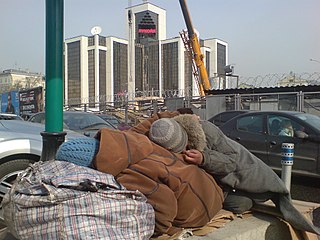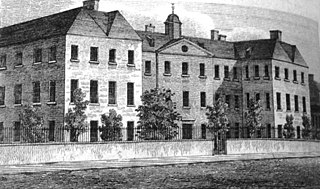
The English Poor Laws were a system of poor relief in England and Wales that developed out of the codification of late-medieval and Tudor-era laws in 1587–1598. The system continued until the modern welfare state emerged after the Second World War.

Bonyads are charitable trusts in Iran that play a major role in Iran's economy. They control an estimated 20% of Iran's GDP, and are second only to the oil industry in manufacturing, trading, and real estate development in Iran. As of 2010, the largest bonyad is the Mostazafan Foundation, worth approximately $10 billion. In addition to large national bonyads like the Mostazafan Foundation, there are numerous bonyads affiliated with local clerics in "almost every" Iranian town. All are answerable only to the Supreme Leader of Iran. As of 2008, bonyads employ somewhere between 400,000 and 5 million Iranians.

A donation is a gift for charity, humanitarian aid, or to benefit a cause. A donation may take various forms, including money, alms, services, or goods such as clothing, toys, food, or vehicles. A donation may satisfy medical needs such as blood or organs for transplant.

In Britain and Ireland, a workhouse was an institution where those unable to support themselves financially were offered accommodation and employment. The earliest known use of the term workhouse is from 1631, in an account by the mayor of Abingdon reporting that "we have erected wthn [sic] our borough a workhouse to set poorer people to work".

A charitable organization or charity is an organization whose primary objectives are philanthropy and social well-being.

Pauperism is poverty or generally the state of being poor, or particularly the condition of being a "pauper", i.e. receiving relief administered under the English Poor Laws. From this, pauperism can also be more generally the state of being supported at public expense, within or outside of almshouses, and still more generally, of dependence for any considerable period on charitable assistance, public or private. In this sense, pauperism is to be distinguished from poverty.
The Charity Organisation Societies were founded in England in 1869 following the 'Goschen Minute' that sought to severely restrict outdoor relief distributed by the Poor Law Guardians. In the early 1870s a handful of local societies were formed with the intention of restricting the distribution of outdoor relief to the elderly.

The Highland Potato Famine was a period of 19th-century Highland and Scottish history over which the agricultural communities of the Hebrides and the western Scottish Highlands saw their potato crop repeatedly devastated by potato blight. It was part of the wider food crisis facing Northern Europe caused by potato blight during the mid-1840s, whose most famous manifestation is the Great Irish Famine, but compared with its Irish counterpart, it was much less extensive and took many fewer lives as prompt and major charitable efforts by the rest of the United Kingdom ensured relatively little starvation. The terms on which charitable relief was given, however, led to destitution and malnutrition amongst its recipients. A government enquiry could suggest no short-term solution other than reduction of the population of the area at risk by emigration to Canada or Australia. Highland landlords organised and paid for the emigration of more than 16,000 of their tenants and a significant but unknown number paid for their own passage. Evidence suggests that the majority of Highlanders who permanently left the famine-struck regions emigrated, rather than moving to other parts of Scotland. It is estimated that about a third of the population of the western Scottish Highlands emigrated between 1841 and 1861.

The Poor Law Amendment Act 1834 (PLAA) known widely as the New Poor Law, was an Act of the Parliament of the United Kingdom passed by the Whig government of Earl Grey. It completely replaced earlier legislation based on the Poor Relief Act 1601 and attempted to fundamentally change the poverty relief system in England and Wales. It resulted from the 1832 Royal Commission into the Operation of the Poor Laws, which included Edwin Chadwick, John Bird Sumner and Nassau William Senior. Chadwick was dissatisfied with the law that resulted from his report. The Act was passed two years after the Representation of the People Act 1832 which extended the franchise to middle-class men. Some historians have argued that this was a major factor in the PLAA being passed.

The Poor Relief Act 1601 was an Act of the Parliament of England. The Act for the Relief of the Poor 1601, popularly known as the Elizabethan Poor Law, "43rd Elizabeth" or the Old Poor Law was passed in 1601 and created a poor law system for England and Wales.

The Charitable Uses Act 1601 or the Charitable Gifts Act 1601 is an Act of the Parliament of England. It was repealed by section 13(1) of the Mortmain and Charitable Uses Act 1888.

In English and British history, poor relief refers to government and ecclesiastical action to relieve poverty. Over the centuries, various authorities have needed to decide whose poverty deserves relief and also who should bear the cost of helping the poor. Alongside ever-changing attitudes towards poverty, many methods have been attempted to answer these questions. Since the early 16th century legislation on poverty enacted by the Parliament of England, poor relief has developed from being little more than a systematic means of punishment into a complex system of government-funded support and protection, especially following the creation in the 1940s of the welfare state. Poor relief will control crime if adequately given.
From the reign of Elizabeth I until the passage of the Poor Law Amendment Act 1834 relief of the poor in England was administered on the basis of a Poor Relief Act 1601. From the start of the nineteenth century the basic concept of providing poor relief was criticised as misguided by leading political economists and in southern agricultural counties the burden of poor-rates was felt to be excessive (especially where poor-rates were used to supplement low wages. Opposition to the Elizabethan Poor Law led to a Royal Commission on poor relief, which recommended that poor relief could not in the short term be abolished; however it should be curtailed, and administered on such terms that none but the desperate would claim it. Relief should only be administered in workhouses, whose inhabitants were to be confined, 'classified' and segregated. The Poor Law Amendment Act 1834 allowed these changes to be implemented by a Poor Law Commission largely unaccountable to Parliament. The act was passed by large majorities in Parliament, but the regime it was intended to bring about was denounced by its critics as un-Christian, un-English, unconstitutional, and impracticable for the great manufacturing districts of Northern England. The Act itself did not introduce the regime, but introduced a framework by which it might easily be brought in.

Lesbian, gay, bisexual, and transgender (LGBT) rights in the British Crown dependency of the Isle of Man have evolved substantially since the early 2000s. Private and consensual acts of male homosexuality on the island were decriminalised in 1992. LGBT rights have been extended and recognised in law since then, such as an equal age of consent (2006), employment protection from discrimination (2006), gender identity recognition (2009), the right to enter into a civil partnership (2011), the right to adopt children (2011) and the right to enter into a civil marriage (2016).

The practice of charity, which is the voluntary provision of assistance to those in need, serves as a humanitarian act, and is unmotivated by self-interest. Various philosophies about charity exist, with frequent associations with religion.
Social work has its roots in the attempts of society at large to deal with the problem of poverty and inequality. Social work is intricately linked with the idea of charity work; but must be understood in broader terms. The concept of charity goes back to ancient times, and the practice of providing for the poor has roots in all major world religions.
A charitable organization in Canada is regulated under the Canadian Income Tax Act through the Charities Directorate of the Canada Revenue Agency (CRA).
Fidyah or fidya and kaffara or kaffarah are religious donations made in Islam when a fast is missed or broken. The donations can be of food, or money, and it is used to feed those in need. They are mentioned in the Qur'an. Some organizations have online fidyah and kaffara options.

The Act for the Provision and Relief of the Poor was a statute passed by the Parliament of England during the reign of King Edward VI. It is a part of the Tudor Poor Laws and reaffirms previous poor laws enacted in 1536, 1547, and 1549 which focused primarily on the punishment of vagabonds. The Poor Act 1551 designated a new position, "collector of alms," in each parish. Local authorities and residents elected two alms collectors to request, record, and distribute charitable donations for poor relief. It further provided that each parish would keep a register of all its “impotent, aged, and needy persons” and the aid they received. Parish authorities were directed to “gently exhort” any person that could contribute but would not, referring them to the Bishop of the Diocese if they continued to refuse. Punishment for neglecting poor relief obligations was adopted in 1563 and reliance on charity was replaced by a system of taxation in 1597. Under the assumption that all poor would be cared for, begging openly was now forbidden. Licensed begging would be reinstated by the Marian Parliament of 1555 with the requirement that legal beggars wear badges.

The Scottish poorhouse, occasionally referred to as a workhouse, provided accommodation for the destitute and poor in Scotland. The term poorhouse was almost invariably used to describe the institutions in that country, as unlike the regime in their workhouse counterparts in neighbouring England and Wales residents were not usually required to labour in return for their upkeep.













